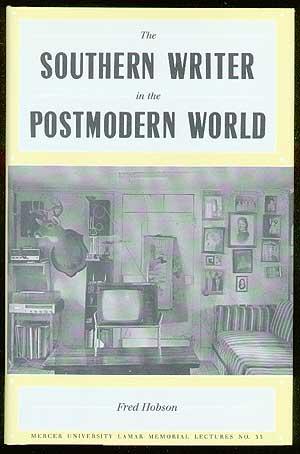This slender volume—it embodies the 33 rd of the Mercer University Lamar Memorial Lectures—is most welcome. The topic is a matter of broad interest, and the author knows his stuff. As scholar and critic, professor and editor, Fred Hobson is a respected authority, one to be alertly attended.
He doesn’t let us down. He wants to show us where Southern fiction has gone since the 1960’s—since the civil rights revolution, integration, the passing of the giants of the Southern Renascence, the bloat of fast money, cable television, Jimmy Carter, and other improvements in the quality of life. Let’s see: Faulkner died in 1962, Flannery O’Connor in 1964, Allen Tate in 1979, Robert Penn Warren and Walker Percy only recently. Andrew Lytle^ and Eudora Welty survive, unique creators, ones who remind us that there was a time when Southern fictionists were the best in the country. That’s not been the case for some while—a point that Fred Hobson lets go while he concentrates on the changes in fictional subject matter that reflect social adjustments, and on elements of continuity that can be identified. If the South is more than a geographical expression, then it may still have an identifiable literature.
Since a Coke-dimmed tide of popular culture—TV, rock, movies—has engulfed the South with the rest of the Republic, there must be a fictional accounting for the new environment. Hobson turns first to Bobbie Ann Mason’s In Country and shows that this novel, though seeming to be about people without historical consciousness, is in its way very much concerned with history. He also shows that Mason herself represents a step down in social class from that of the best Southern writers of the past. Mason and others are a different class of Southerner, and represent an extension of the franchise of literature.
Lee Smith’s Oral History receives a sophisticated treatment, one that shows the power of suggestion of that novel which examines a clash of cultures between the old and the new as well as between Tidewater and mountain Virginia. In commenting on Barry Hannah (a very different writer of a different South), Hobson calls him “perhaps the boldest, zaniest, and most outrageous writer of the contemporary South.” He sees Hannah as continuing the traditions of Southwest Humor and Southern Gothic, as an heir of Faulkner and Wolfe, and as a meditator on history. Hannah has extended the world of Walker Percy’s fiction—but he isn’t alone in that.
Hobson classifies Richard Ford and Josephine Humphreys as writers in the tradition of Walker Percy. In what I think are his most brilliant pages, Hobson shows how the restless Ford remains a Southern writer in spite of his wanderings. His analysis of Ford’s The Sportswriter decodes a series of puns, anagrams, allusions, and “sly and nearly hidden references,” “cunning and slippery” evidence of the postmodern nature of that novel and of its relationship to Percy’s The Moviegoer and other Southern fiction. Hobson finds Josephine Humphreys’ Dreams of Sleep more straightforward to deal with, but no less valuable for that. The engagements with history and with personal authenticity show Dreams of Sleep to be a novel about the condition of the South as revealed by that remarkable city, Charleston.
Though Hobson finds continuity in contemporary Southern fiction—the humor, rewrites (often female) of Huckleberry Finn—he also sees a return of an old problem: the trap of local color. Two who have evaded that snare by finding a transcendence in the particular are, to him, Fred Chappell and Ernest Gaines. I have myself said much the same thing about Fred Chappell twice in print, and also about Ernest Gaines, at a panel discussion in 1984. Hobson uses A Gathering of Old Men to show Gaines as a literary heir of Faulkner; I advanced the argument that The Autobiography of Miss Jane Pittman is an outstanding Southern novel because of the intensity of its historical consciousness. I guess that shows that great minds think alike.
But not always. I wouldn’t call Barry Hannah “offensive,” nor would I ever use such an absurd pseudo-construction as “homophobic.” Neither would I bow so often (if at all) in the direction of feminists, or take Alice Walker seriously. Hobson’s remarks on Walker strongly imply that she should not be considered a Southern writer, since her idea of “community” is so completely befogged by obsessive ideology. Walker of course raises the problem also of quality, of judgment and priorities, and of political correctness as a literary phenomenon, particularly in a volume that explicitly repudiates Donald Davidson’s politics while smoothly exploiting his insights.
Professor Hobson’s casual reference to a Confederate cause that was “truly lost . . . truly unworthy and doomed” dismisses so much history, literature, and legend, that to me it contradicts the idea, not to mention the fact, of a distinctive Southern culture or cultures. Nevertheless, I have enjoyed reading this monograph on contemporary Southern fiction, and have learned from it. There can be no question that Fred Hobson has sorted out some of the phenomena of the present scene. I don’t doubt that The Southern Writer in the Postmodern World will be frequently consulted, and will influence the way Southern literature will be regarded, and even the way some master’s essays and doctoral theses will be focused. Fred Hobson has chosen this forum and form to make sense of the cutting edge of Southern literature as it is being created, in a work that is mostly a pleasure and an edification.
[The Southern Writer in the Postmodern World, by Fred Hobson (Athens and London: The University of Georgia Press) 120 pp., $17.95]

Leave a Reply